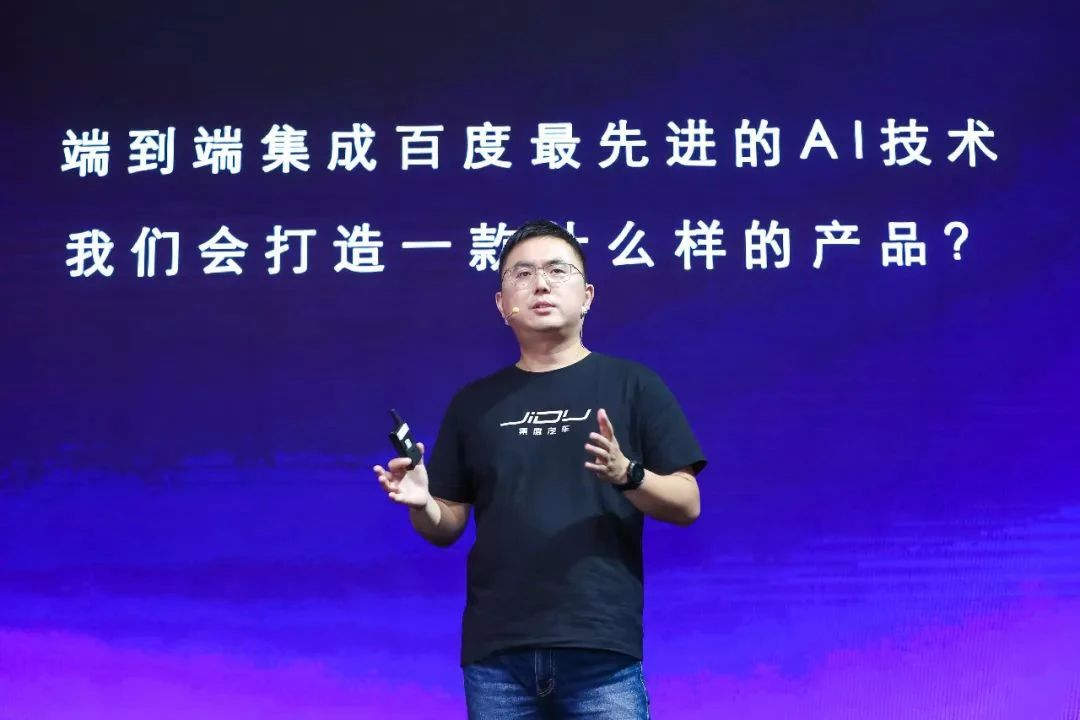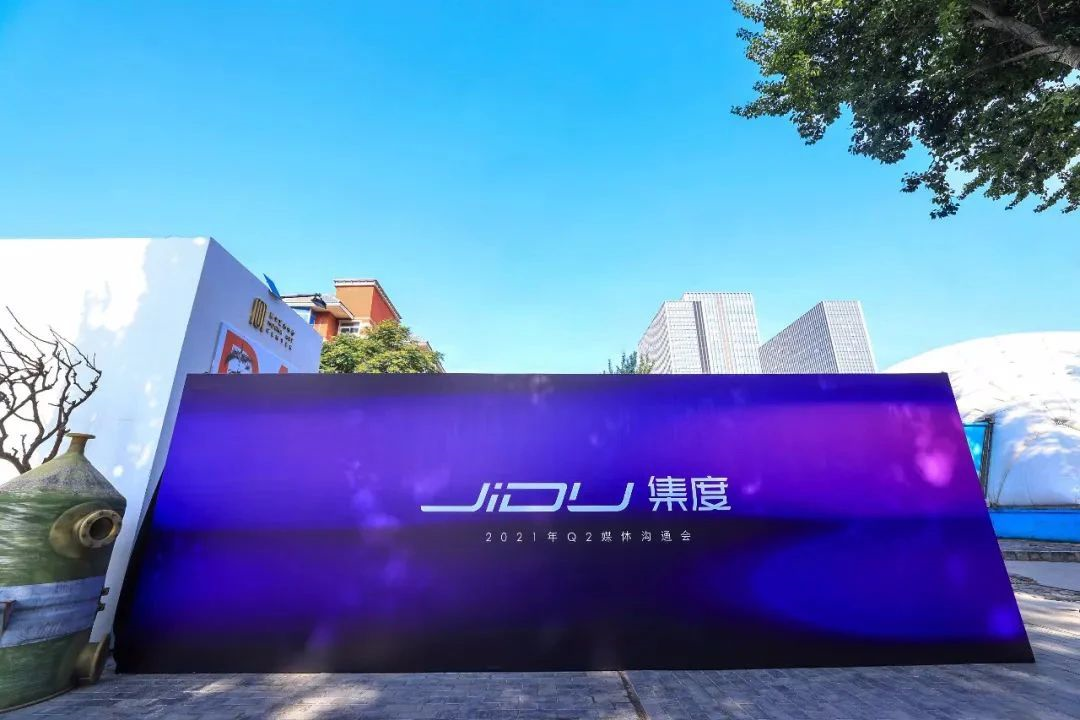Author: Lu Mengyi
Compared with Weixiaoli, Jidu Automobile is becoming a new force.
In January, it was officially announced; in March, it was officially registered; in April, a media communication conference was held in Baidu Building; on June 1st, the day when Jidu Automobile was registered for three full months, the Q2 media communication conference was held.
Jidu Automobile is moving very fast. Jidu Automobile CEO Xia Yiping has set a goal that by April next year, there will be a car model that is “close to mass production” at the auto show. “We are pushing forward with full force, and trying to compress this time further, hoping to bring some surprises.”
Xia Yiping, who was previously known as the co-founder and chief technology officer of Mobike, is still an 80s after but is referred to as “Uncle Xia” within Jidu, which also proves that the Jidu team is very youthful.
Xia Yiping has a deep connection with the automotive industry. He jumped from the IT industry to the automotive industry in 2009 and was one of the first people to start doing car networking. After leaving Mobike, all his career choices have been related to AI. When he met Baidu founder Robin Li in late 2020, they communicated for about a month, and then Xia Yiping decided to join Jidu to make cars after receiving a formal invitation – it was almost a “Yes, I do!” decision.
After joining Jidu, Xia Yiping joked that he was much more tired. “When Mobike was just starting out, there was only one circuit board for the bike parts, but now there are dozens of circuit boards, and hundreds and thousands of parts. The complexity is very different.” However, from designing to product development, engineering, software, and even operational aspects, all the relevant core teams at Jidu Automobile have been basically established.
Jidu’s first car has no competitors or differentiated competition; it costs more than 200,000 yuan; and the target audience is mainly the younger generation of 90s and 95s, while also considering the needs of female car owners.
“Next, we will go forward at full speed.” Xia Yiping said.
What was done in 100 days?
In April, Xia Yiping reviewed the process of recruiting the team for the past two months in a media interview, “I interviewed two to three hundred people, often from 9 am to 9 pm on weekends, 12 hours in a row, because without people or a team, you simply can’t do this.”
The team is very important for a start-up. If you want to maintain a very leading position in the competition of electric vehicles in the future, the talent system and team structure must be very suitable for future development.Xia Yiping introduced that at the beginning of March, the four or five people at Jidu all worked online, without an office. In April, they rented a small office in Zhangjiang, Shanghai that can accommodate 18 people, and the speed of recruitment was quite fast. In May, they moved to Hongqiao.
From its registration in March until now, Jidu has officially employed more than 100 staff members, and with the people joining in the next one or two months, the total number will exceed 200. The product team currently has about dozens of people, with a higher proportion.
In addition, the first product of Jidu Automobile also took shape during these three months. Jidu’s product design, exterior and interior design choices and directions have basically been determined, and have entered the next stage of 3D modeling research and development.
At present, Jidu Automobile has roughly divided its product design concept into three parts. The first is the design concept, ROBOTIC, which focuses on the interaction level, and emphasizes the robotic sense. The second is EMOTIONAL, which is the humanization after interaction, forming a certain emotional connection. The third is FUTURISTIC, which can be understood as the recognition of design.
Xia Yiping hopes “everyone can recognize at a glance that this car is made by Jidu”. This is also Li Yanhong’s idea; he hopes that the futuristic robotic design will be very distinctive. On the one hand, it represents a more cutting-edge user experience, and on the other hand, it can also carry Baidu Apollo’s advanced technology capabilities.
Is it natural for Baidu to enter the field?
Undoubtedly, Jidu Automobile has a deep Baidu DNA.
Li Xiang, the founder of Ideal Autos, has stated that any new technology company that wants to enter the intelligent auto field needs three years from forming a team to market research, to product development, experimentation, production, factory manufacturing, and to delivering products to the market, to make fairly good products. Jidu Automobile made rapid progress in just over 100 days, thanks to Baidu’s advantages.
From the perspective of technical accumulation, Baidu is more qualified to make cars than other technology companies.
Baidu has been laying out autonomous driving since 2013; in July 2014, Baidu launched the “Baidu autonomous driving car” research and development plan; in 2017, Baidu launched the world’s first autonomous driving open platform, Apollo, stating that it would provide an open, complete, and safe software platform to partners in the automobile and autonomous driving fields. At the Baidu AI Developer Conference that year, Li Yanhong rode in a Baidu autonomous driving car on the Fifth Ring Road.
Baidu has also received international recognition in the field of autonomous driving.According to the US research firm Navigant Research, Baidu has risen from a “challenger” in 2017 to a “leader”, standing in the same league as overseas giants such as Google Waymo and Cruise. In California Department of Motor Vehicles (DMV)’s “2019 Autonomous Vehicle Disengagement Reports,” Baidu surpassed Google Waymo as the leader in disengagement rate calculation.
In the Q1 earnings call this year, Li Yanhong clearly analyzed three commercial paths for future autonomous driving.
The first is to provide Apollo autonomous driving technology solutions to original equipment manufacturers, to help vehicle companies quickly build autonomous driving capabilities. The second is to create a Baidu-branded vehicle, end-to-end integrating Baidu’s autonomous driving innovations and pushing the most advanced technologies to the market as soon as possible. The third is to share unmanned vehicles.
These paths are also being realized one by one. Providing solutions for original equipment manufacturers, reflected in WM Motor, WM W6 equipped with Baidu Apollo AVP unmanned autonomous parking system, which can achieve unmanned driving in specific scenarios. Baidu’s shared unmanned vehicles have been developed in many places in China, and on the first three days that Beijing Shougang Park opened to the public, Baidu Apollo GO completed more than 800 orders.
During the development process, Jidu Automobile will also rely on Baidu’s supercomputing platform, algorithms, high-precision maps, intelligent driving cloud, and other technologies from the research and development stage to build the ability to achieve intelligent cabins, intelligent driving, intelligent clouds, intelligent maps, and multidimensional cooperation from hardware to OS to voice to application ecology, human-machine, and shared driving maps.
Next: Competing on “end-to-end” capabilities
Xia Yiping once used the development history of mobile phones as an analogy for the automotive industry. Today, the entire competition of mobile phones has evolved from purely hardware competition to ecological competition. This kind of ecology means that a mobile phone company must have chip capabilities, OS capabilities, cloud big data analysis capabilities, and AI capabilities to remain unbeaten in the competition, and it must also have a very strong user ecology.
Although the complexity of the product form of mobile phones and cars is completely different, from the first principle perspective, the core of car intelligence is also high-end technology ecology, which deeply integrates into the current intelligent cars. For example, the chassis, platform, and other technologies can deeply integrate with current electric vehicle technology, and provide the best products to users. This will be the most core competitiveness of electric vehicles or intelligent electric vehicle industries in the next 3-5 years.
In Xia Yiping’s view, it is very important to build products with very good user experience, and end-to-end capabilities are crucial for achieving good fusion on technology completeness and user experience.
 集度汽车 deeply integrated the end-to-end advanced autonomous driving capability of Apollo. A key to achieving this was the emergence of the Gelly Haohan platform.
集度汽车 deeply integrated the end-to-end advanced autonomous driving capability of Apollo. A key to achieving this was the emergence of the Gelly Haohan platform.
Xia Yiping stated that the Gelly Haohan platform, whether in terms of its openness, bandwidth or flexible expansion, can to a large extent support the core AI and software capabilities that will be required by Jidu Automotive’s intelligent vehicles in future.
However, this is only the first step. To become a truly intelligent product that can self-learn, self-evolve and self-iterate, strong support is needed from the cloud, such as the processing power of back-end AI and data, which are indispensable elements of the core competitiveness loop of intelligent electric vehicles in the future. Therefore, the technology chain is very long.
In order to achieve these goals, Baidu will cooperate with Gelly to jointly develop a completely L4-focused intelligent architecture, JET. This architecture fully integrates Apollo’s advanced capabilities with Gelly’s platform seamlessly, ensuring that products can be iterated very quickly both in the software layer and the application layer. Jidu Automotive will work together with Apollo and Gelly to develop SOA software architecture, and decouple their own design and R&D architecture with hardware and software.
Since Gelly is now involved, an inevitable question arises: Is Gelly a “tool” for Baidu’s car-making venture?
At the communication conference, Xia Yiping once again explained the definition of “leadership,” which is more reflected in the overall product thinking and direction, mutual recognition and coordination. It is a recognition of the concept of competition in future unmanned and intelligent car products, not the leadership of managers.
However, the challenges of this cooperation are also evident. It will take a lot of additional work to seamlessly integrate Apollo’s core capabilities with the Haohan platform. Jidu Automotive is still a long way from mass production. Judging from the time it takes for several technology companies to launch their first cars, it generally takes three years. New forces such as the “Weixiaoli” with mass-produced cars and traditional automakers are vying for a place in the market, and the automotive industry may look different three years from now.
Just one day before Jidu Automotive’s press conference, it was reported that 360 has already started building its own car team, recruiting positions include perception fusion algorithms, software architecture, information security, intelligent driving development, etc. The referral bonus for all positions adds up to hundreds of thousands, showing that the automotive market has truly become a “red ocean”. However, this also shows that the window of opportunity for car-making has not yet closed.”Doing the right thing at the right time often yields twice the result with half the effort,” said Xia Yiping. It can be seen that speed has become a label of Jidu Auto. At the brand launch event in October, Jidu Auto may bring more surprises.
This article is a translation by ChatGPT of a Chinese report from 42HOW. If you have any questions about it, please email bd@42how.com.
